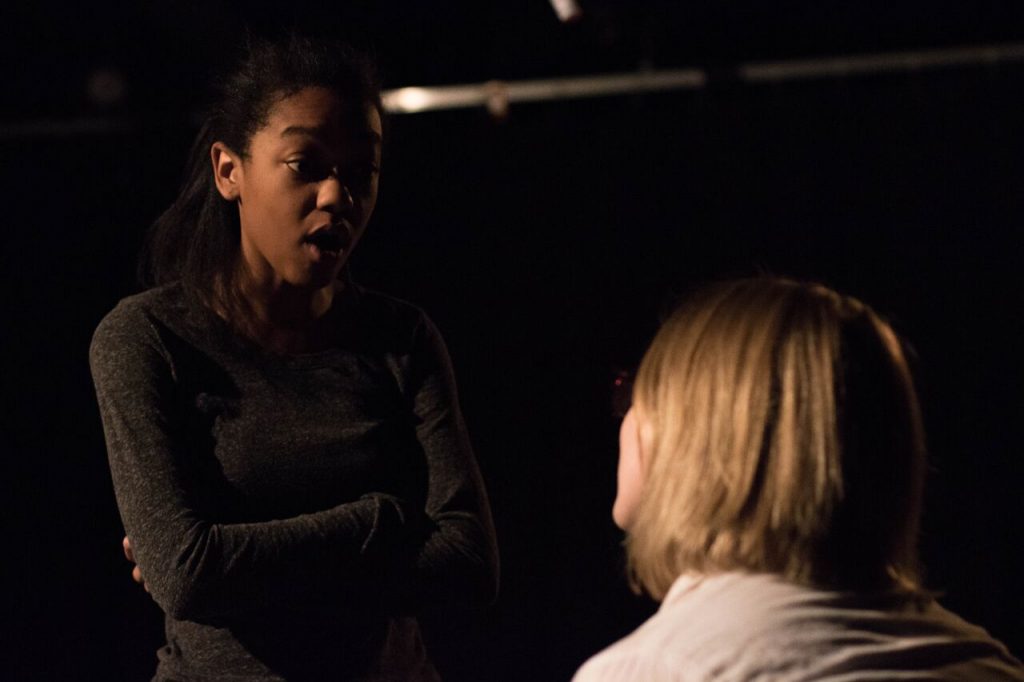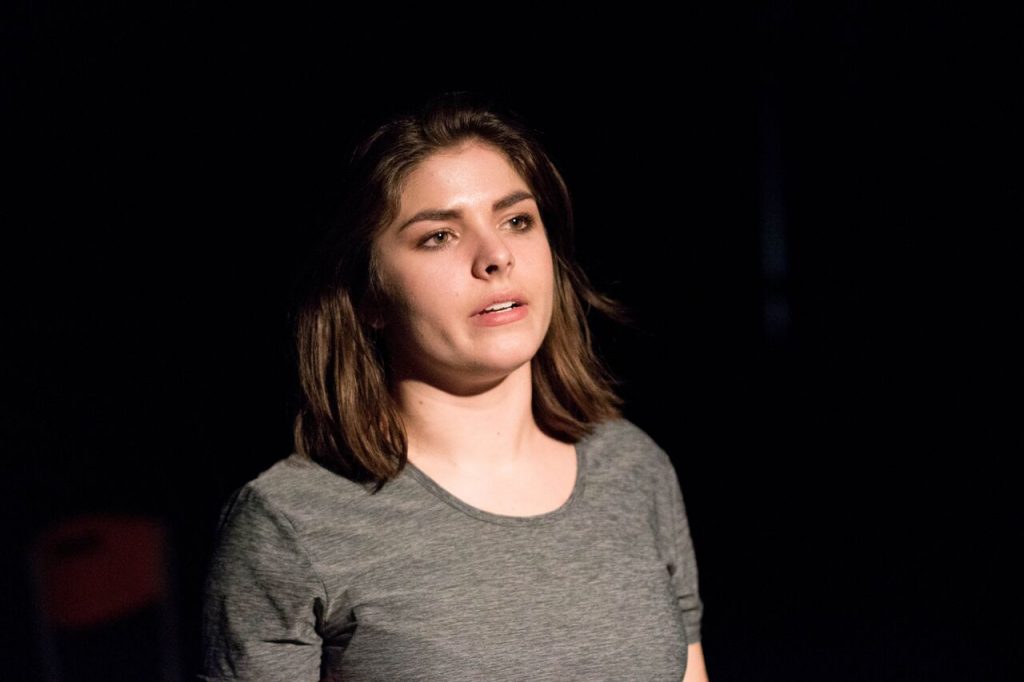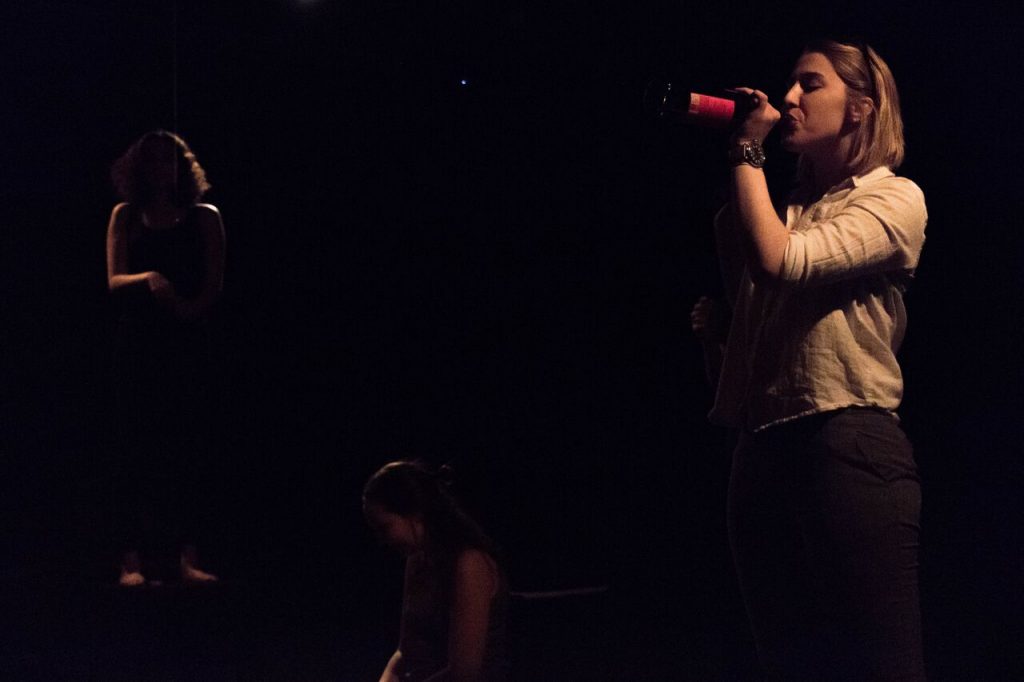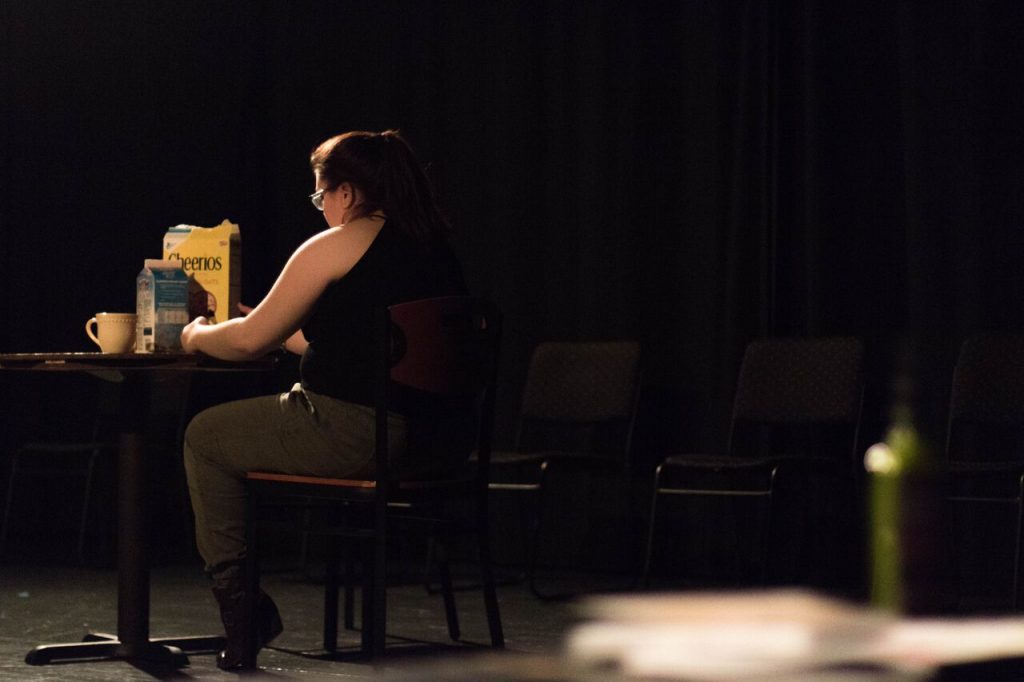By Philip Merrick ’18
4.48 Psychosis, the first Studio Lab of the semester, is a raw, emotional play by Sarah Kane about living life with clinical depression. On Monday, staff writer Philip Merrick ’19 sat down to speak with a few people involved in the production. They discuss topics in the play, the challenges of the rehearsal process, and their hopes and fears as the show approaches opening night.
Taylor Goodwin ’20, Actor
Tell me what this experience has been like as your first production with Skidmore Theater.
These last couple weeks with this cast have been a lot of fun. We’ve grown really close. It’s a lot of hard work, especially because it’s a very abstract piece. We have to delve into the characters that we’ve been assigned, that weren’t given to us by the playwright, so it’s been fun to divide up and figure out who represents what. It’s been a really fun first experience in the Skidmore Theatre Department.

Kara Powell ’18 speaks with Lindsay Nuckel ’17. Photo: Dante Haughton ’19
Rachel Karp ’18, Director
What is the most important reason for an audience to see this play?
I think that mental illness is often underrepresented or misrepresented in theatre, and film and television, in that it’s either not talked about or it’s stigmatized or it’s romanticized. With this production, we tried to portray mental illness in a way that feels very real and human and truthful. It’s important for audiences to see that onstage and to also see an ensemble performing this show, a community performing this show, as opposed to one individual who is either romanticized or stigmatized.
Did you ever fear during this process that you were going to end up romanticizing it or stigmatizing it in a way that you didn’t mean to do?
Absolutely. I think it’s a really fine line to walk between stigmatization and romanticization and creating this very truthful portrayal of these experiences that a lot of us haven’t actually had that much experience dealing with. It’s definitely something that we tried to have as a conversation throughout the rehearsal process.
It’s two days before you guys open. What are your biggest hopes and fears?
My biggest fear, which I hope is irrational, is that the show will somehow be dangerous or damaging for the audience, because the content is at times very intense and I want it to do more good than harm. My biggest hope is that it will leave the audience thinking and questioning and with something to talk about.

Miranda Park ’17 Photo: Dante Haughton ’19
Lea Tanenbaum ’19, Lighting Designer
What are you most excited about, either in your own job, or just watching the play?
I think the show is super important and I think Rachel, the cast, and Eva, the stage manager, are all really doing a great job of making this something we haven’t seen before. They’re playing with the space in a very interesting way, and Rachel’s giving me a lot of freedom with lighting. She’s really letting me play with darkness, which a lot of directors would be hesitant about.
You said that Rachel is letting you use darkness, can you tell me more about that?
Rachel’s really okay with [the actors] being dimly lit, or their faces being slightly obscured. Because the show is in a thrust, different audience members are going to get different experiences. The darkness lets some stuff be a mystery and it’s a way to physically show the fact that we can’t always know what’s going on with other people.

Lindsay Nuckel ’17 sips on wine bottle in production of Sarah Kane’s 4.48 Psychosis. Photo: Dante Haughton ’19
Bianca Thompson ’19, Actor
What has been the most challenging part of this rehearsal process?
The endless possibilities. Because the text is just text and it doesn’t have any stage directions or character names, we have so much room to play, and that has been one of the most enjoyable parts of this process. [It’s] also one of the most difficult, because we can come in with a ton of ideas and we have to pick just one.
I was also going to ask about your favorite part, but you’re kind of answering that too.
My favorite part would be giving a voice to a lot of the really ugly sides of mental illness. Being able to speak text that is uncomfortable and scary is really exhilarating for me as an actor, and as someone who has dealt with a lot of the issues in this show. It’s exhilarating and wonderful to be able to use my experiences and the experiences of people that I’ve met and that I know and put it on stage.
What do you think watching this is going to be like for the audience?
I think it’ll be a roller coaster! I hope that we challenge the audience’s perception of what theatre is and what theatre can be. I want the audience to think, and this production will make the audience think a lot.

Bianca Thompson ’19 shies away from camera in production of 4.48 Psychosis. Photo: Dante Haughton ’19
